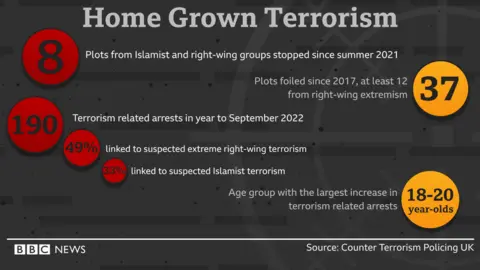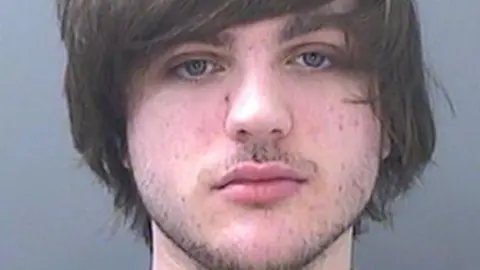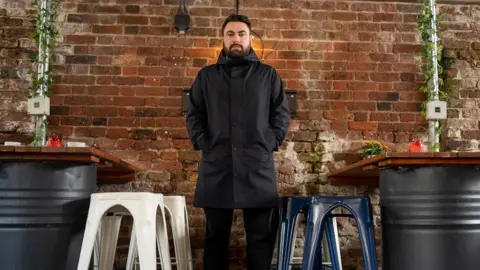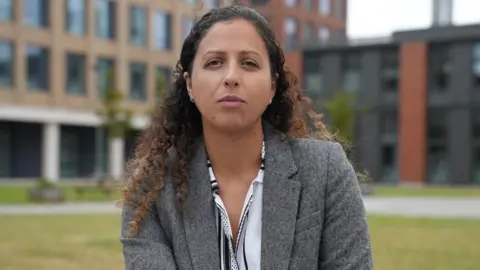Terrorism: Police concern over teen far-right extremism
A rise in teenagers involved with neo-Nazi groups and far-right extremism is "incredibly alarming", a counter-terrorism detective has said.
Det Supt Gareth Rees said police could not "arrest our way out of" the issue.
On Wednesday, Luca Benincasa, 20, from Cardiff, was locked up after admitting to being a member of a neo-Nazi group.
Experts called it a "hugely dangerous time", saying Covid and the cost of living crisis could push more young people towards the far-right.
There are also concerns around how the internet is used to share material.
"In terms of the ages, we've seen the low teens - and that is an incredibly alarming thing to see," Det Supt Rees said.
"We have seen people engaged in attack plots, attack planning, looking at attacking locations or individuals.
"But we've also seen significant volumes of offences related to sharing, downloading and sending material, which breaches the terrorism act.
"You've got people who are very young, very impressionable, and very vulnerable who are being drawn into a very worrying area which not only affects their own wellbeing, but also ultimately presents a threat to other people."
Det Supt Rees, the right-wing terrorism lead at Counter Terrorism Policing, said the threat has grown and "evolved" in recent years.
"We need to understand how we can stop young people making decisions and being drawn into an area that is both very sad and very damaging and, ultimately at the top level, very threatening."

Benincasa was sentenced to nine years and three months in prison at Winchester Crown Court in Hampshire on Wednesday for being a "prominent" member of the banned neo-Nazi group Feuerkrieg Division.
He previously pleaded guilty to terrorism offences after becoming increasingly involved with far-right ideologies during the Covid lockdown.
He held at least 33 one-to-one conversations with potential recruits from across the world, some as young as 14.
A Nazi dagger and documents on how to make explosives and poisons were found by police at his home.
 Counter Terrorism Policing
Counter Terrorism PolicingIn 2021, a 16-year-old boy from Cornwall was sentenced after leading the British arm of Feuerkrieg Division.
He downloaded his first bomb-making manual when he was 13, making him one of the UK's youngest terror offenders.
Det Supt Rees said extremists use political, social and economic instability to "push narratives" in conspiracy theories and influence young people.
"If you use Covid as an example, people were more isolated, they didn't have those core networks, whether it be sports, leisure, social, teachers other family networks to challenge some of those views," he said.
The most extreme British neo-Nazi organisation in recent years - National Action - was co-founded by Alex Davies, from Swansea.
Some of its members openly celebrated the murder of the MP Jo Cox.
The organisation used child-like images to target and recruit young people.
Far-right 'like a vulture'
Joe Mulhall spent years undercover exposing neo-Nazi and far-right groups as director of research at anti-fascism organisation, Hope not Hate.
The organisation played a crucial role in preventing the murder of Labour MP Rosie Cooper by neo-Nazi Jack Renshaw.
He believes young people no longer have to search for extreme, hateful content online - rather, it comes to them.
"They're shockingly young, 13 or 14, and they're involved in very extreme, explicitly overt terrorist behaviour, and those numbers are just increasing," he said.

Mr Mulhall said young people were "networking and discussing race war, discussing overt terrorism, in a way that was just much rarer a few years ago".
He said young people were now bombarded online with a "grab-bag" of hateful ideologies.
"Now, you can sit in a bedroom anywhere in the world and at the click of a button you can come across extreme far-right material, you can consume holocaust denial books, anti-Muslim books, terrorist manuals," he said.
"The hurdles for getting involved that would have often prohibited young people from being able to get into far-right groups traditionally just aren't there anymore - and you can do it anonymously.
"It can just pop up on your timeline."
Experts are concerned that people who first engaged with the far-right during the pandemic are now susceptible to their narratives around the cost-of-living crisis.
Dr Lella Nouri, a leading expert on the far-right, said "uncertainty breeds extremism".
"I suppose with the financial crisis we are in that situation right now," she said.

Dr Nouri, a senior lecturer in criminology at Swansea University, said the confusion and lack of information around Covid played into the hands of the far-right and was a powerful tool to push their message.
"The world was in chaos, Wales was in chaos, the UK was in chaos, and at points of chaos there's uncertainty.
"And when we have uncertainty we look for answers, and the far-right were very quickly the ones to give those answers. False answers."
Dr Nouri said the far-right were now capitalising on the cost-of-living crisis and the financial difficulties people are facing.
"Certain communities are more vulnerable, specifically those who feel disillusioned, whether that be because of financial pressures, lack of employment or maybe where they've just sort of ended up in life," she said."
British counter terrorism police have said it is a "significant challenge" to sift through the huge volume of extremist content online and spot what could turn into an attack.
Det Supt Rees said the internet was an "exceptionally significant" tool for the far-right.
He added that he was keen to stress the important role local police and the public played in preventing children from being drawn into extremism.
"It's not just working with policing alone, it's a strong relationship between counter-terrorism policing experts, local policing and communities.
"You kind of need all those pillars to work together."

- BBC WALES INVESTIGATES: The subjects affecting the lives of people in Wales
- A CAREER CHANGE WITH A DIFFERENCE: Police new recruits adapt to life on the beat

